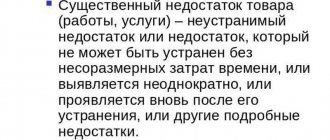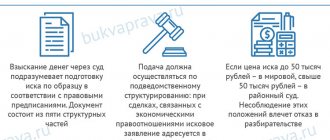Protection of consumer rights in Moscow is carried out by state supervisory authorities, local government bodies, as well as public associations that operate in accordance with the Law “On the Protection of Consumer Rights”.
This page contains information about existing organizations where you can complain and contact regarding consumer rights protection issues in Moscow.
These organizations advise consumers on various problematic issues in the field of consumer protection, help draw up claims or complaints for pre-trial resolution of conflicts, provide legal assistance in preparing statements of claim and supporting cases in court. Legal advice in most organizations is provided free of charge.
Basic concepts used in this Law
- consumer - a citizen who intends to order or purchase, or who orders, purchases or uses goods (work, services) exclusively for personal, family, household and other needs not related to business activities; (as amended by Federal Law No. 212-FZ of December 17, 1999)
- manufacturer - an organization, regardless of its legal form, as well as an individual entrepreneur, producing goods for sale to consumers; (as amended by Federal Law No. 212-FZ of December 17, 1999)
- performer - an organization, regardless of its organizational and legal form, as well as an individual entrepreneur performing work or providing services to consumers under a paid contract; (as amended by Federal Law No. 212-FZ of December 17, 1999)
- seller - an organization, regardless of its organizational and legal form, as well as an individual entrepreneur who sells goods to consumers under a sales contract; (as amended by Federal Law No. 212-FZ of December 17, 1999)
- the paragraph is no longer valid. — Federal Law of December 21, 2004 N 171-FZ;
- deficiency of a product (work, service) - non-compliance of a product (work, service) or with the mandatory requirements provided for by law or in the manner established by it, or with the terms of the contract (in their absence or incompleteness of the conditions usually presented to the requirements), or with the purposes for which the product (work) , service) of this kind is usually used, or for the purposes of which the seller (performer) was informed by the consumer when concluding the contract, or by sample and (or) description when selling goods according to the sample and (or) description; (as amended by Federal Laws dated December 17, 1999 N 212-FZ, dated October 25, 2007 N 234-FZ)
- a significant defect of a product (work, service) is an irreparable defect or defect that cannot be eliminated without disproportionate costs or time, or is detected repeatedly, or appears again after its elimination, or other similar defects; (as amended by Federal Laws dated December 17, 1999 N 212-FZ, dated December 21, 2004 N 171-FZ)
- safety of a product (work, service) - safety of a product (work, service) for life, health, consumer property and the environment under normal conditions of its use, storage, transportation and disposal, as well as the safety of the process of performing work (providing a service);
- an organization authorized by the manufacturer (seller) or an individual entrepreneur authorized by the manufacturer (seller) (hereinafter referred to as the authorized organization or authorized individual entrepreneur) - an organization carrying out certain activities, or an organization created on the territory of the Russian Federation by the manufacturer (seller), including a foreign manufacturer ( a foreign seller), performing certain functions on the basis of an agreement with the manufacturer (seller) and authorized by him to accept and satisfy consumer demands in relation to goods of inadequate quality, or an individual entrepreneur registered on the territory of the Russian Federation, performing certain functions on the basis of an agreement with the manufacturer (seller) ), including with a foreign manufacturer (foreign seller), and authorized by him to accept and satisfy consumer demands regarding goods of inadequate quality; (paragraph introduced by Federal Law of December 21, 2004 N 171-FZ)
- importer - an organization, regardless of its legal form, or an individual entrepreneur, importing goods for its subsequent sale on the territory of the Russian Federation. (paragraph introduced by Federal Law of December 21, 2004 N 171-FZ)
How is such a society formed?
A group of individuals who intend to unite and form a society for the protection of consumer rights must decide on the type of organization and develop a charter.
The founders carefully examine the document and approve or reject the version, giving comments, until a charter for the future organization or association is drawn up that suits everyone and does not contradict the laws of the Russian Federation.
The creation of a public organization is regulated by the following legislative acts:
- Art. 30 of the Constitution of the Russian Federation;
- Law “On Public Associations” dated May 19, 1995 No. 82-FZ;
- Law “On Non-Profit Organizations” dated January 12, 1996 No. 7-FZ;
- Civil Code of the Russian Federation.
The main governing body is the general meeting (or conference), which must, under the minutes, make a decision on the creation of such an organization, come up with and approve the full name, elect a board, adopt a charter, and select an audit commission.
All actions are then directed by the elected board until the term of re-election expires.
After completing all the documents, you should go through the registration procedure, and it is important that the address of the future legal entity is officially registered, and there is also a receipt for payment of the state duty.
Public organizations register with the Ministry of Justice of the Russian Federation, where they review the entire package of documents and make a decision on registration.
If the decision is positive, then you can contact the Federal Tax Service to enter the newly-minted organization into the register of legal entities. persons (Unified State Register of Legal Entities).
A registered public association automatically receives a tax identification number and registration with the Pension Fund, Compulsory Medical Insurance Fund, and Social Insurance Fund. The complete registration procedure will take about 1.5 months.
Brief description of the Law of the Russian Federation of February 7, 1992 N 2300 “On the Protection of Consumer Rights”
This Law regulates the relations that arise between consumers and manufacturers, performers, importers, sellers when selling goods (performing work, providing services), establishes the rights of consumers to purchase goods (work, services) of appropriate quality and safe for the life, health, property of consumers and environment, obtaining information about goods (works, services) and their manufacturers (performers, sellers), education, state and public protection of their interests, and also determines the mechanism for the implementation of these rights.
(as amended by Federal Laws dated December 21, 2004 N 171-FZ, dated October 25, 2007 N 234-FZ)
General provisions
In general, consumer protection problems are conditionally divided into the following categories:
- Direct violations committed by suppliers of goods and services in this area;
- A small number of highly specialized lawyers who practice in this area;
- Not every municipality has interdepartmental commissions that protect consumer rights;
- Lack of public organizations that would counteract unscrupulous manufacturers and suppliers;
- Legal nihilism, citizens’ ignorance of their own rights;
- Lack of a widespread culture of seeking and receiving information about the quality of a product or service.
All these problems are solved comprehensively, they take time. But a person’s understanding of the rights granted to him, methods of protection and guarantees from the state is what a consumer rights lawyer can tell.
Some numbers that indicate the scale of the problem:
- A third of Russian citizens encounter disruptions in everyday life - in stores, markets, transport, healthcare, public utilities and the service sector;
- Only 26% of victims (that is, one in four) are ready to defend their rights;
- And only 11% seek qualified legal assistance.
Conclusion: 74% of those affected by the actions of sellers/suppliers of goods and services find themselves defenseless, another 15% try to solve the problem on their own by studying the current legislation. This situation provokes violators to further violate consumer rights.
The largest percentage of victims (36%) in such cases are residents of Moscow and St. Petersburg. Almost every third of them face a repetition of the violation almost every month. A third of them are in the retail sector. The same number is in the field of medicine and the provision of public services.
If you can still give up on a refusal to return goods, then poor quality housing and communal services and medicine directly affects the lives and health of citizens. And if insufficiently warm radiators or water are phenomena that can be eliminated on their own, then incorrect treatment has a negative impact on the patient, and it is difficult to correct the consequences.
The trend in this direction is alarming. Thus, according to Rospotrebnazor, its structures received complaints:
- In 2010 - about 360 thousand.
- In 2020 – about 700 thousand.
Over the past year, the number of consumer rights violations in the healthcare sector has increased by a third. The trend is associated with a sharp increase in private clinics.








